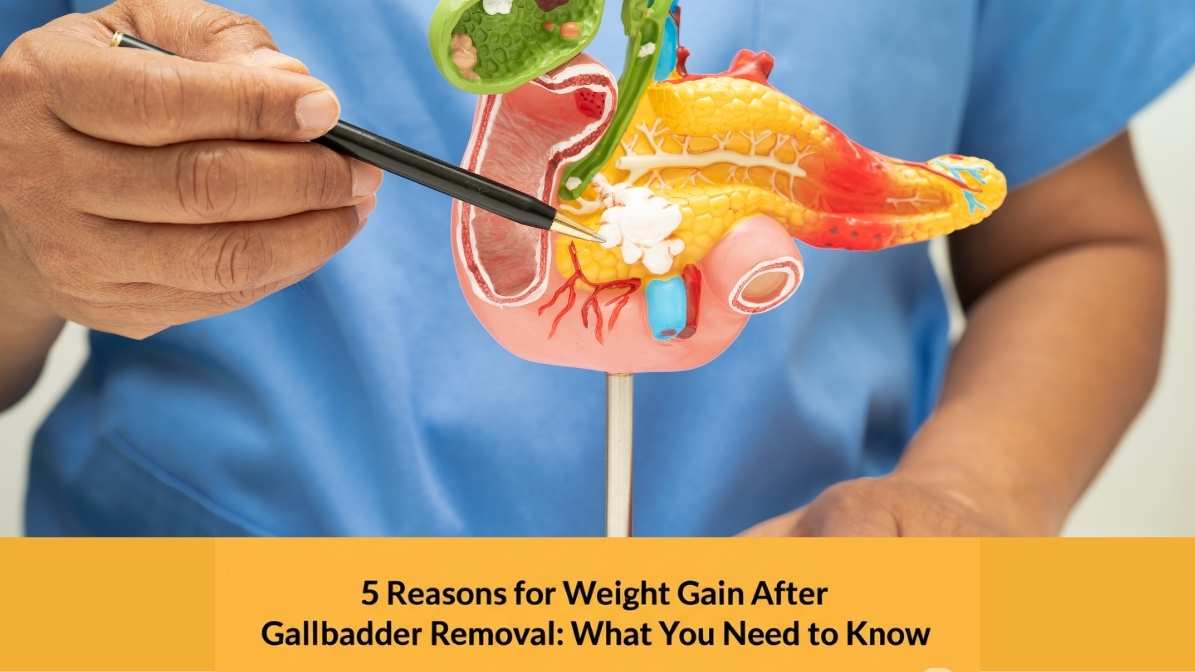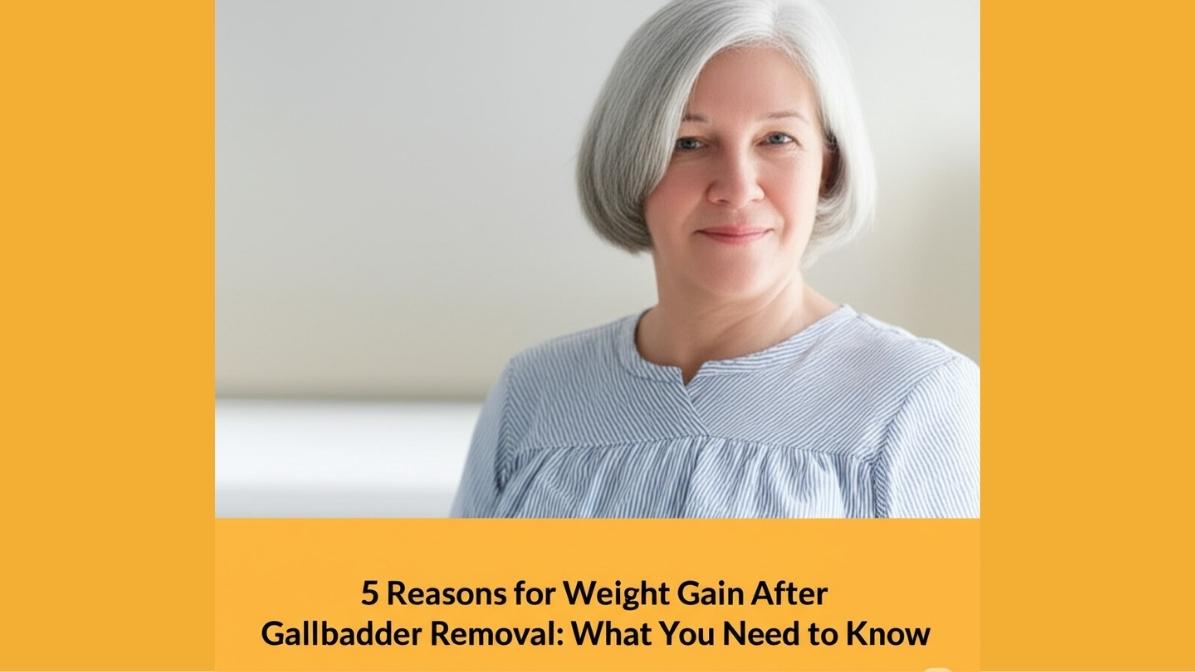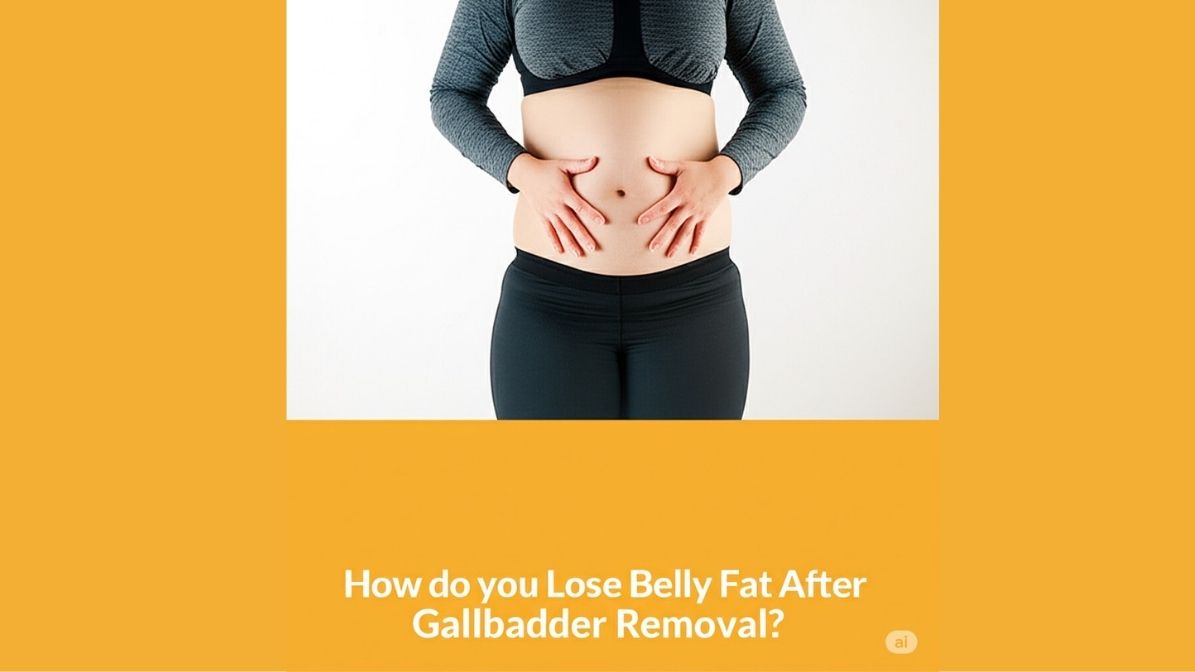Introduction:
Gallbladder removal — a surgery known as cholecystectomy — is a standard treatment for those who develop complications due to gallstones or other related conditions.
With the potential to drastically improve the quality of life by helping to reduce some excruciating symptoms, surgery can also result in some surprising things our bodies do when parts of our glands are removed.
Weight Gain One of the most common concerns among patients who have undergone gallbladder removal surgery is weight gain. In this post, we will discuss five causes of weight gain following cholecystectomy, explain why this can occur, and provide recommendations on what you can do.
Table of Contents

If you’ve had your gallbladder removed and have been experiencing weight gain, you’re not alone. A lot of people struggle with keeping or losing weight after surgery.
Let’s explore what lies behind these changes and how you can navigate them successfully.
Before we discuss why patients might gain weight after surgery, we should start by explaining why the gallbladder needs to be removed in the first place.
Your gallbladder is a small organ located beneath your liver, and its primary function is to store bile. The liver produces it and helps digest fats in the food you eat. When you eat, the gallbladder releases bile into the small intestine to aid in the digestion of fats.
However, the gallbladder can sometimes become troubled, leading to problems such as gallstones, infection, or inflammation. In such circumstances, surgery is required to take out the gallbladder and avoid further complications.
Although gallbladder removal surgery is typically performed to alleviate the problems associated with the organ, the absence of the gallbladder may affect digestion and metabolism, which can, in turn, lead to weight gain in some individuals.
Adverse Effects of Having Your Gallbladder Removed
Gallbladder removal, like any surgery, has risks of adverse side effects, some of which can lead to weight gain.
After surgery, a wide range of changes occur in digestion, and they include the following:
Diarrhea: Since there is no longer anywhere to store bile in the gallbladder, it empties directly into the small intestine at all times. This can lead to diarrhea in a few individuals, particularly after consuming fatty meals.
Indigestion: As there is no gallbladder to store bile, the digestion of fatty foods can be challenging, resulting in bloating and indigestion.
Bloating and Gas: Altered digestion may cause bloating, gas, and fullness after meals.
These problems can make it harder to eat right and maintain a healthy weight.
What To Expect After Gallbladder Surgery
Most people recover from gallbladder surgery within a matter of weeks. Here’s what you can expect:
Most people recover from gallbladder surgery within a matter of weeks. Here’s what you can expect:
Diet Adjustments: You may need to adhere to a low-fat diet to prevent stomach upset. It may be harder for you to process fatty foods without a gallbladder.
Sluggish Digestion: Food can linger a bit longer, making you feel fuller more quickly after eating.
Potential Weight Gain: As you adjust to life without a gallbladder, you may experience fluctuations in your weight and possibly gain weight.
It’s important to know what these changes are to manage them and keep ahead of your health once you’ve had cancer treatment.
5 Some Reasons for Weight Gain After Gallbladder Removal
The question is, why do we gain weight after gallbladder removal? Now, let’s look at five reasons for gaining weight after gallbladder removal.

Obstruction of Bile Flow and Digestion
Your gallbladder stores bile, a digestive fluid produced by your liver that is essential for metabolizing fat. Now, bile from the liver goes directly into the small intestine after the removal of the gallbladder.
This means that bile is actually being dumped constantly and may not be as efficient as releasing it in a controlled way by your gallbladder for the digestion of fats.
Failure to digest fat may result in malabsorption, in which your body does not receive necessary nutrients. This can lead your body to store more fat, leading to weight gain.
Plus, undigested fats can cause gastrointestinal problems such as bloating, diarrhea, and indigestion, and that affects your general health and eating habits.
Slow Metabolism
The slowdown of metabolism is one of the more significant changes that occur once the gallbladder is removed. Without the aid of the gallbladder, the body has a different time to process and break down fats.
This can lead your metabolism to slow, potentially making it more difficult for you to burn calories.
This means that if your metabolism is slow, your body burns fewer calories at rest, contributing to an increase in fat storage. Without any change in your normal or moderate diet routine, you can quickly gain weight, as you are no longer burning as many calories.
Hormonal Imbalances
Hormones are big players in managing your appetite and the way your body stores fat. The removal of the gallbladder may result in hormonal changes, including appetite-regulating and fat-storage hormones.
Your body might have a disturbance in these hormones after surgery. For instance, if bile production is down, there may be an uptick in certain appetite-regulating hormones that leave you feeling more hungry.
It may lead to overconsumption and selection of calorie-rich, low-nutrient foods that can increase weight.
Plus, because your gallbladder affects fat absorption, the theory is that this organ may impact hormones that help regulate fat metabolism, so your body has a tougher time breaking down and burning fat.
Changes in Eating Habits
Many people experience changes in their eating patterns after their gallbladder is removed. Initially, you may experience some digestive issues, such as bloating, gas, or indigestion.
You’ll eat differently to keep these symptoms at bay, for example, by choosing foods that are easier to digest, such as those with a higher fat content. However, overeating fatty foods can lead to weight gain.
After surgery, emotional eating may be triggered and become more pronounced. When you’re feeling down or stressed, you may seek comfort in food, especially high-calorie treats.
These changes in diet, which can increase calorie consumption, ultimately result in weight gain.
Reduced Physical Activity
The recovery from gallbladder surgery may restrict your physical activities for a while. Pain from post-operative healing can be a deterrent to exercising, and digestive challenges can also make you feel like moving less.
The sedentary lifestyle and altered digestion work together, making you gain weight (especially the mid-section).
Continuing to be active is vital to maintaining your weight after the removal of your gallbladder, but the pain and recovery may make keeping a solid workout regimen more difficult.
Could Gallstone Issues Cause Weight Gain?
Indeed, issues with the gallbladder, such as the existence of gallstones or chronic inflammation, may even lead to weight gain before surgery. Gallstones, for instance, can lead to digestive problems, bloating, and pain after eating.
The next issue is that these problems can also lead to less physical activity and different eating habits, which in turn can cause weight gain.
Furthermore, gallbladder problems could result in the body being less effective at breaking down fats, thus causing malabsorption as well as weight gain.
If you are experiencing any of these problems, it is crucial to consult a healthcare provider to discuss your symptoms and available treatment options.
How do you Lose Belly Fat After Gallbladder Removal?
Losing belly fat after gallbladder removal requires a combination of managing your diet, exercise regimen, and lifestyle changes to manage belly fat post-g gallbladder removal effectively.

These are tips on how to lose belly fat:
Stick to a Low-Fat Diet: When you no longer have a gallbladder to help digest fats, it is essential to stick to a low-fat diet. Emphasize lean proteins, fruits, veggies, and whole grains.
Eat More Fiber: Getting enough fiber can help control digestion and reduce bloating. Fiber: Eat more plant-based foods, such as vegetables, beans, and whole grains.
Work out: Begin with low-impact workouts, such as walking, when recovering from surgery. As you recover, you should gradually increase your activity to include strengthening and aerobic exercises.
Stay Hydrated:
Staying hydrated can help reduce bloating and promote better digestion.
Stay away from sugar: Avoid the consumption of sugary food and drinks, as these can cause weight gain and aggravate digestive issues.
Is It More Difficult to Lose Weight If You Have Had Your Gallbladder Removed?
Yes, losing weight without a gallbladder can be challenging. Losing the gallbladder affects the digestion and metabolism of fat. It is hard to lose fat without a gallbladder. Nevertheless, weight loss can still occur healthily.
Eating healthfully, exercising regularly, and taking good care of your digestive health are all key to maintaining a healthy weight after cholecystectomy.
What cannot You Drink Without a gallbladder?
After the removal of the gallbladder, beverages can either contribute to or hinder the ease of food digestion. It’s best to avoid:
Sugary Drinks:
These can lead to bloating and weight gain.
Alcohol: Alcohol irritates the digestive system and can make symptoms like diarrhea and bloating worse.
Caffeine-Containing Drinks:
Caffeine irritates the stomach lining and hurts digestion. Instead, hydrate yourself with water, herbal teas, or low-sugar beverages that promote digestion.
Why Does My Stomach Stick Out More After Gallbladder Surgery?
Many people complain about bloating and stomach extension after undergoing surgery.” This has many causes:
Digestive Changes: You may experience bloating and gas after gallbladder removal, as your body has a more challenging time digesting fats without your gallbladder.
Post-Surgery Recovery: After surgery, swelling can also cause the stomach to appear larger.
Dietary Changes: Are you consuming an unusually high amount of processed or fatty foods? This can cause you to feel bloated and experience stomach discomfort.
To help alleviate bloating, try eating smaller, more frequent meals and choose foods that aren’t known to cause digestive issues, thereby addressing what causes bloating in the first place.
Conclusion
Gallbladder-removal surgery, also known as cholecystectomy, can bring positive changes to your digestive system — some patients have noted that it contributed to weight loss.
The five reasons that can lead to gaining weight after gallbladder removal—interrupted bile flow, slow metabolism, hormone deficits, dietary modifications, and lower levels of physical activity are potential causes of weight gain.
However, you can overcome these obstacles and maintain a healthy weight with a proper diet, lifestyle, and exercise.
Continue to be proactive with your health, and remember that consistency is everything! If you are struggling, consider asking for guidance from a healthcare provider or dietitian to be able to manage your life after a gallbladder operation successfully.



